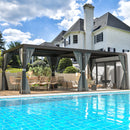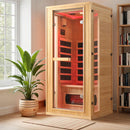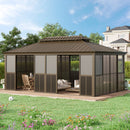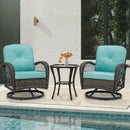Best Temperature:How Hot is a Sauna?

The Hottest Tolerable Sauna Temperature
As one of the sauna enthusiasts, we all know the great benefits of saunas, but some of us may also have a misunderstanding about sauna temperature: “the hotter the better.” However, in fact, people’s tolerance for temperature is different due to physiological factors and environmental influences. A high temperature is not suitable for everyone. In 2010, a sauna endurance contest with an extreme temperature of 110 °C caused one death and multiple injuries. This tragic consequence reveals the danger of extreme sauna temperatures. That is why we are writing this article to discover “how hot should a sauna be”.
Different Saunas with Different Temperatures
There are many types of saunas, each with its own average sauna temperature. From infrared saunas to steam rooms, smoke saunas, and traditional saunas with either electric or wood-burning stoves, even saunas that operate similarly can feel quite different. The size, shape, materials, and airflow of a sauna all influence how hot is a sauna and how quickly it heats up and cools down. You may find that your preferred sauna temperature varies depending on the type of sauna you’re using. Different sauna types have their own ideal temperature ranges as they all operate in unique ways. The average sauna temperature varies as follows:
-
Steam Sauna Temperature
A steam sauna, also known as a steam chamber, is a type of sauna that produces a humid, hot atmosphere. Its humid air helps cleanse nasal passages and ease congestion as well as respiratory conditions. Generally, steam rooms are not as hot as other saunas, they are usually heated between 104 and 122 degrees Fahrenheit (40–50 °C) with a nearly 100 percent humidity. This humidity in a steam room will make you feel far hotter than in other saunas, even though their relative temperatures are not particularly high. We suggest heating between 110°F and 120°F (43°C and 49°C) for a more pleasant experience. Although the temperature is not too high, the surroundings feel considerably hotter due to the high humidity.

-
Traditional Sauna Temperature
Finnish saunas are the best representative of the traditional saunas. This sauna was regarded as a holy spot by ancient Finns. The average temperature of most Finnish saunas is between 80 – 100 °C (176 – 212 °F), because of their unique heating method. A number of stones will be heated up in the wood-burning or electric stove, and the user will pour water on the surface to generate a steam burst, which increases the humidity. Unlike steam saunas, the general humidity of this traditional sauna can only be kept between 10% and 20%, resulting in a dry and hot environment. High temperatures can create a strong heat impact on your body and bring associated sauna benefits when you begin to sweat.
However, users should be mindful of their body’s responses to temperature changes and prevent symptoms of overheating or dehydration during the session. According to PMC search, the best temperature for traditional saunas is around 80 – 90 °C (176 – 194 °F) with low humidity for 10–20 min per round. This temperature range is good for sweating and relaxation while avoiding too much pressure on your body.
-
Infrared Sauna Temperature
Infrared saunas are the most modernized type of heat therapy sauna. Unlike traditional saunas that heat the surrounding air, infrared saunas utilize infrared panels to heat the body directly. Thus, infrared saunas are generally cooler than traditional saunas and are typically set between 100°F and 140°F (38°C and 60°C) for a balanced experience. In addition, the temperature ranges can be slightly different if your home saunas have the new techniques:
- Full Spectrum Infrared: Many users find an optimal experience at temperatures ranging from 130°F to 140°F (54°C to 60°C).
- Infrared Sauna with RLT Lamp: For a 1-2 person sauna with a red light therapy lamp, you can adjust the temperature based on how your face feels.
- Sauna with LED Chromotherapy Lighting: You can just keep the general temperature during use.
Although infrared saunas have relatively low temperatures, their infrared rays can penetrate deeper into the dermal layers of your skin. This deep heat mechanism can offer several health benefits, including better circulation, pain reduction, and greater detoxification. Many individuals also find infrared saunas to be more pleasant because the lower temperature makes them feel less stressed on the cardiovascular system. That’s why infrared saunas are ideal for those who either prefer a mild experience or are sensitive to high temperatures. They also help high-risk and hypersensitive patients avoid some of the adverse effects associated with traditional saunas.
Best Sauna Temperature for You
Choosing the Proper Sauna Temperature
Generally speaking, the human body finds a suitable sauna temperature between 122°F to 149°F (50°C to 65°C). This temperature range lets the body sweat enough for cleansing and relaxation without getting uncomfortable due to its high temperature. However, the specific temperature range can vary depending on many factors, such as the individual's physique, sauna environment, size and number of users, and the length of your sauna session:
- Individual Physique: Everybody has a varied degree of heat tolerance. It’s better to adjust the sauna temperature to a range that your body feels comfortable in.
- Environment: The temperature setting can be influenced by several environmental elements, including humidity in the sauna, the condition of air circulation, and the temperature difference between inside and outside.
- Duration of Your Sauna: Your body will gradually adjust to the temperature once you step into the sauna room. Thus, the temperature could seem more pleasant if you’ve spent some time in the sauna. However, a sauna session over 30 minutes should be avoided.
- Size and Number of Users: Compared to 1-2 person saunas, larger saunas with higher user capacity may require a longer time to reach the target temperature.

How to Control The Ideal Temperature of The Sauna
- Control the Heating Time: Traditionally, the temperature inside the sauna room rises continually over time. The longer you’ve been heating, the temperature keeps going up. Luckily, modern saunas with an electrical temperature control system can maintain a stable temperature level.
- Adjust the Ventilation: The efficiency of ventilation is closely tied to heat loss and temperature change. If you’re feeling the surroundings are too stuffy, try opening the door or window slightly to improve air circulation.
Last Thoughts
In one word, deciding “how hot is a sauna” depends on sauna types, individual needs, and health considerations. Whether you want to enjoy the intense heat of a traditional Finnish sauna, the soothing humidity of a steam sauna, or the gentle warmth of an infrared sauna, it’s important to listen to your body and make adjustments as needed. Ultimately, the best sauna temperature is the one that allows you to relax, rejuvenate, and stay safe.
If you have any further questions about your sauna temperature or getting the most out of your sauna, our team is here to help!



















